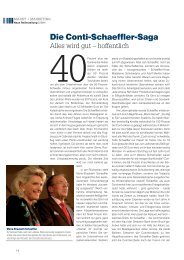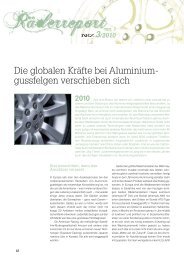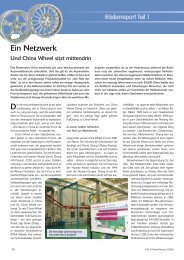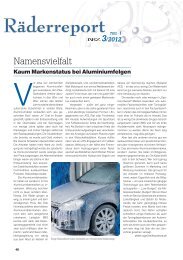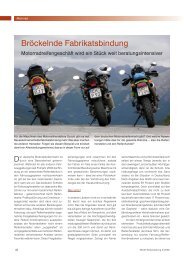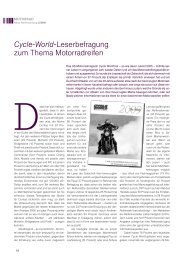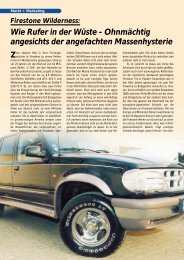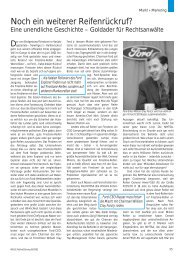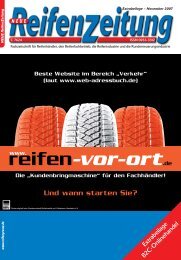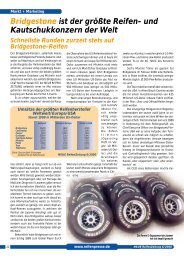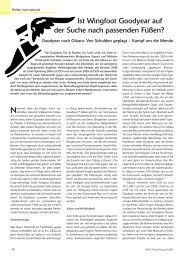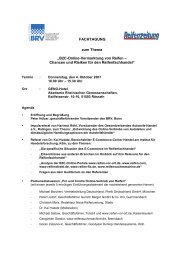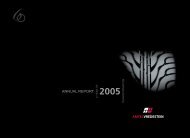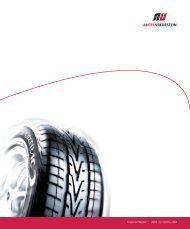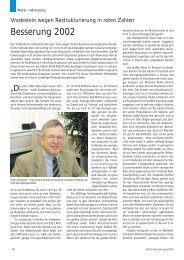NEUE REIFENZEITUNG Extrabeilage/China ... - Reifenpresse.de
NEUE REIFENZEITUNG Extrabeilage/China ... - Reifenpresse.de
NEUE REIFENZEITUNG Extrabeilage/China ... - Reifenpresse.de
Erfolgreiche ePaper selbst erstellen
Machen Sie aus Ihren PDF Publikationen ein blätterbares Flipbook mit unserer einzigartigen Google optimierten e-Paper Software.
and this will be <strong>de</strong>ci<strong>de</strong>d in relation to Western competition. At the<br />
very least Mr Delcroix believes the current trend of a market<br />
consolidation in <strong>China</strong> will continue along the lines of market<br />
consolidations that take place in any emerging market. How<br />
many manufacturers will survive as in<strong>de</strong>pen<strong>de</strong>nt manufacturers?<br />
At Deldo they think that about two dozen companies will be able<br />
to remain in<strong>de</strong>pen<strong>de</strong>nt in the mid-term. It won’t continue to help<br />
Chinese tyre manufacturers for ever that they can benefit from lower<br />
production costs in <strong>China</strong> and – as everybody is convinced –<br />
from subsidies. Emerging markets are called “emerging” because<br />
their economic systems including costs, etc. are increasingly catching<br />
up with well established and industrialised Western<br />
markets. Investment bankers are already talking about the “next<br />
11”, the emerging markets from the second line behind states<br />
such Brazil, Russia, India and <strong>China</strong> (BRIC states). Presumably, it<br />
is states like Vietnam or Bangla<strong>de</strong>sh that are increasingly<br />
stepping into the long-term international focus as cheap<br />
production bases and profitable sales markets.<br />
Is it really a question of quality?<br />
So if the price of Chinese tyres is the first of two major issues that<br />
we often argue about, quality is the second big issue. Guido Bernaerts,<br />
a man who has 37 years experience in the tyre industry<br />
and has <strong>de</strong>alt with Chinese companies for 14 years, has closely<br />
followed this issue throughout his career. On countless occasions<br />
the owner and managing director of International Bernaerts Trading<br />
N.V. (IBT) based in Antwerp, Belgium, has travelled throughout<br />
<strong>China</strong> in or<strong>de</strong>r to establish and maintain relations with his suppliers<br />
and to negotiate with them. When Guido Bernaerts, who<br />
foun<strong>de</strong>d his company in 1984 as an international wholesaling<br />
company, went to <strong>China</strong> for the first time in the middle of the<br />
1990s to explore the possibility of starting a business there, there<br />
was literally not a single tyre manufacturer able to produce radial<br />
tyres. And it was not even a question whether or not the Chinese<br />
tyre market would want to buy radial tyres. There was just no need<br />
for these tyres on the market because there were no mo<strong>de</strong>rn passenger<br />
cars and no mo<strong>de</strong>rn network of motorways that would<br />
necessitate the production of radials. Very recently, in the course<br />
of this current <strong>de</strong>ca<strong>de</strong>, things in <strong>China</strong> have changed dramatically,<br />
Mr Bernaerts points out.<br />
Today, International Bernaerts Trading no longer has the exclusive<br />
rights to any Chinese tyre brand. Until 2002 the company<br />
was exclusive European distributor of Wanli bran<strong>de</strong>d tyres. After<br />
these exclusive relations were cancelled, as Guido Bernaerts explains,<br />
because of “too little quality and product portfolio,” the<br />
company put its Chinese tyre business on a broa<strong>de</strong>r basis and today<br />
has available a large variety of different brands and products<br />
from the Chinese low-budget and UHP tyre segments.<br />
That the Chinese manufacturers of these tyres sometimes<br />
have different opinions on how to proceed in regards to negotiations<br />
is something a newcomer to the Chinese tyre market has to<br />
learn very quickly. When a European <strong>de</strong>legation thinks that a<br />
signed negotiation protocol equals a contract, its opposite from<br />
<strong>China</strong> believes that such a paper is just the beginning of contract<br />
negotiations. Often, Chinese partners don’t feel legally obliged<br />
when Europeans do. Corresponding “differences in mentality”<br />
have to be un<strong>de</strong>rstood and accepted if a company wants to do<br />
business with Chinese tyre manufacturers and other suppliers<br />
6<br />
nehmen übrig bleiben? Delcroix räumt mittelfristig etwa zwei Dutzend<br />
diese Chance ein. Obwohl chinesische Unternehmen durch<br />
die geringeren Produktionskosten – und durch die, so glauben<br />
alle, regelmäßig geleisteten staatlichen Unterstützungen – natürlich<br />
einen Wettbewerbsvorteil haben, wird dies nicht ewig anhalten.<br />
Schwellenlän<strong>de</strong>r heißen <strong>de</strong>shalb Schwellenlän<strong>de</strong>r, weil sich<br />
ihre Wirtschaftssysteme mit all <strong>de</strong>n kleinen Details wie Kosten,<br />
etc. eben <strong>de</strong>nen arrivierter westlicher Industriestaaten annähern.<br />
Investmentbanker prägen bereits das Schlagwort <strong>de</strong>r „Next-11“,<br />
<strong>de</strong>r Schwellenlän<strong>de</strong>r <strong>de</strong>r zweiten Reihe nach Brasilien, Russland,<br />
Indien und <strong>China</strong> (BRIC-Staaten). Demnach sind es Län<strong>de</strong>r wie<br />
Vietnam o<strong>de</strong>r Bangla<strong>de</strong>sch, <strong>de</strong>nen man langfristig bereits Potenzial<br />
als günstiger Produktions- und profitabler Absatzmarkt einräumt.<br />
Eine Frage <strong>de</strong>r Qualität?<br />
Während also die Preise chinesischer Reifen das erste große<br />
Thema darstellen, ist die Qualität das zweite. Guido Bernaerts, <strong>de</strong>r<br />
seit 37 Jahren in <strong>de</strong>r Reifenbranche tätig ist und seit nunmehr 13<br />
Jahren aktiv Geschäfte mit chinesischen Unternehmen macht, hat<br />
während seiner Laufbahn das Thema stets genau verfolgt. Unzählige<br />
Male ist <strong>de</strong>r Inhaber und Geschäftsführer <strong>de</strong>r International<br />
Bernaerts Trading N.V. (IBT) mit Sitz in Antwerpen durch <strong>China</strong> gereist,<br />
um dort Kontakte mit neuen und alten Herstellern zu pflegen<br />
und Verhandlungen über Lieferungen zu führen. Als Guido Bernaerts,<br />
<strong>de</strong>r sein Unternehmen 1984 als Reifengroßhan<strong>de</strong>l mit<br />
internationaler Ausrichtung gegrün<strong>de</strong>t hatte, Mitte <strong>de</strong>r 1990er Jahre<br />
erstmals <strong>China</strong> besichtigte, um dort eventuell geschäftlich aktiv<br />
zu wer<strong>de</strong>n, gab es nicht einen einzigen Reifenhersteller, <strong>de</strong>r Radialreifen<br />
fertigte. Wozu auch, fragt er rhetorisch. Es gab auch so gut<br />
wie keine mo<strong>de</strong>rnen Personenkraftwagen und kein mo<strong>de</strong>rnes<br />
Schnellstraßennetz, was <strong>de</strong>n Einsatz von Radialreifen notwendig<br />
gemacht hätte. Erst zu Beginn dieses Jahrzehnts begannen die<br />
Verän<strong>de</strong>rungen, sich zu überschlagen, so Bernaerts.<br />
Während International Bernaerts Trading heute keine Alleinvertretungsrechte<br />
für eine<br />
<strong>de</strong>r chinesischen<br />
Marken hat, vermarktete<br />
<strong>de</strong>r belgische<br />
Großhändler die Marke<br />
Wanli bis 2002 exklusiv<br />
in Europa.<br />
Nach<strong>de</strong>m diese exklusivenBeziehungen<br />
dann wegen „zu<br />
geringer Qualität und<br />
Produktpalette“ been<strong>de</strong>t<br />
wur<strong>de</strong>n, wie Guido<br />
Bernaerts erklärt,<br />
stellte das Unternehmen<br />
seine Aktivitäten<br />
in <strong>China</strong> auf eine<br />
Guido Bernaerts<br />
breitere Basis und<br />
pflegt seither ein breites Sortiment im Low-Budget- wie auch im<br />
High-Performance-Marktsegment.<br />
Dass die chinesischen Hersteller entsprechen<strong>de</strong>r Produkte<br />
dabei gelegentlich an<strong>de</strong>re Auffassungen in Bezug auf Vertragsverhandlungen<br />
haben, müsse ein <strong>China</strong>-Neuling schnell lernen. Wäh-



